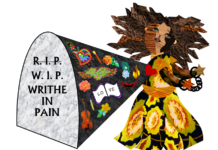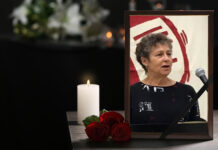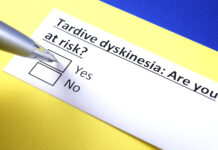Why Not Seek Treatment Through the Mental Health System?
When I was emotionally stuck, I didn’t feel the current understanding of psychiatric problems and treatment would help. In fact, I felt it would be a hindrance to recovery.
The New York Times Confidently Misinterprets a New ECT Study
The New York Times article paints a rosy picture of ECT, but it’s based on a misleading study and dismisses the plentiful research on ECT’s harms.
Childhood Gaslighting: When Difference Receives a Diagnosis
Aside from the home, school is typically where we learn our worth or lack of it. We learn what we are taught, and how we are taught is often what we are taught.
#FreeBritney Takes the Capitol: Rallygoers Seek Momentum for Guardianship Reform
Members and supporters of Free Britney America staged their third demonstration so far this year in Washington, DC, in support of ending conservatorships.
Can Critiques of Psychiatry Help us Imagine a Post-Capitalist Future? An Interview with Hans...
An interview with Hans Skott-Myhre on the seeds of post-capitalist subjectivity to be found in the writing of Franco Basaglia and R.D. Laing.
How and Why Neurotypicals Misunderstand and Mistreat Autistic People
Commonly used autism interventions, such as ABA, have been found to be both ineffective and abusive, inflicting trauma on those subjected to them.
Researchers Provide Guidance for Reducing and Stopping Psychiatric Drugs
New guidance on how to taper and discontinue from psychiatric drugs from leading researchers Mark Horowitz and David Taylor.
People Don’t Recover So Spectacularly from Criminal Psychiatry
Psychiatry and Catholicism have too much in common, both founded by men, upon questionable source materials. I knew I was in danger, not being helped.
Remembering Darby Penney — A Fierce Advocate for Justice and Human Rights
Celia Brown, Ron Bassman, and Peter Stastny mourn the loss of Darby Penney, who fought to transform the mental health system in New York.
A Dystopian Vision of Psychiatry’s Future
As a psychiatric survivor, I was stunned to see a medical professional describe a dystopian nightmare as a vision of progress for psychiatric medicine.
Peer Respite: Why It Should be Everyone’s Concern
My intent with this blog is to compare some lessons learned from my recent medical crisis response to a similar peer-run respite response.
RIP: Ed White – Advocate, Researcher and Supporter
It is with great sadness that we write about the loss of one of our colleagues from the psychiatric drug withdrawal community; Doctor Ed White.
New Perspectives on Eating Disorders: An Interview with Shira Collings
“Eating disorder recovery is about rejecting oppressive values.” Therapist Shira Collings discusses person-centered approaches to dealing with food-related challenges in youth.
Fate of a Whistleblower: I Spoke Out About Abrupt Med Withdrawal
A rapid withdrawal can be very dangerous and even deadly. You do not solve the problem by firing those who point this out, but that happened to me.
A New Liberation Movement, Focused on Relationship
The harm that medical-model practitioners inflicted on me had to be managed and overcome. This delayed my progress resolving my childhood traumas.
Postpartum Anxiety, Psychiatric Drugs and Paternalism
My postpartum anxiety diagnosis became subsumed by an arbitrary diagnosis of depression. And this diagnosis has followed me for 30 years and counting.
I Set Up a Suicide Crisis Centre to Provide the Opposite of What I...
Our approach is to openly care about our clients and empower them as much as possible. It's vital that clients know we care about their survival.
Manufacturer of Tardive Dyskinesia (TD) Drugs Finds TD Emotionally Devastating
“Patients expressed feeling unaccepted by society or uncomfortable in their own skin… A few indicated that they would rather be dead than have tardive dyskinesia.”
In a PBS documentary, ECT Is Bad for “Curing” Homosexuality, but Great for Depression!
A new documentary about gay activists' defeat of the APA ends with a disclaimer that ECT is "effective" for severe depression. Bruce Levine spoke with the filmmakers.
Reversing My Diagnosis
I was fine until traumatic events collided and pushed me to a state of emotional crisis. Yet I emerged this time as a different person, and knew I had to exit the mainstream mental health system.
Antipsychotics Linked to Increased Breast Cancer Risk
Long-term exposure to prolactin-increasing antipsychotics increases the odds of developing breast cancer.
Why Some Experts and Patients Want to Rename Schizophrenia: Interview with Raquelle Mesholam-Gately and...
MIA interviews Matcheri Keshavan and Raquelle Mesholam-Gately on their research with service users and consumers on renaming schizophrenia.
What Happens When A Peer Is Accused of Relapsing?
Once my colleague started spreading her conviction that I was relapsing, the whole agency began scrutinizing my behavior. As a peer, you’re under constant suspicion.
New Rating Tool for Tapering Antidepressants and Antipsychotics
Researchers developed a rating scale to better assess service users’ experiences tapering antidepressant and/or antipsychotic medication.
NGRI: The Gilligan’s Island of the Criminal Justice System
I approached the NGRI system with the belief that my commitment would be short and sweet and that in less than one year I would be back to living in the community. That year turned into nearly two decades.

































